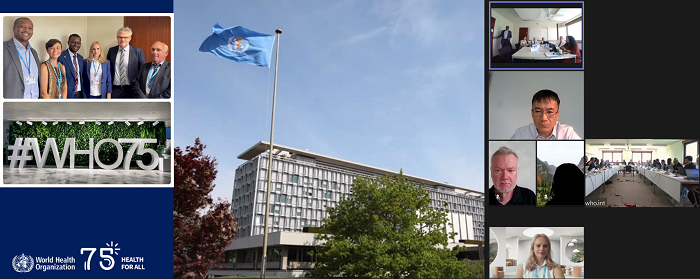The Consultation on Good Practices for Health Products Manufacture and Inspection, hosted by the Norms and Standards for Pharmaceutical Team & the WHO Prequalification Inspection Service (PQT), was held in Geneva, Switzerland, on 27-29 June 2023. The annual meeting aims to align the guidelines produced by WHO to support inspectors when verifying compliance with good practices and the practical experience gained in the field by inspectors from PQT and National Regulatory authorities. The meeting was attended by representatives of 15 countries, including from Ukraine – Natalia Volovyk and Dmytro Leontiev, Deputy Director for Quality and Deputy Director for Science, respectively, at Ukrainian Scientific Pharmacopoeial Center for Quality of Medicines.
The primary objective of the consultation on 27 June 2023 was to facilitate an open discussion with industry and regulatory representatives regarding:
1. Continuous manufacturing (CM) of Active Pharmaceutical Ingredients and Finished Pharmaceutical Products.
2. Regulatory considerations for artificial intelligence (AI) in pharmaceutical manufacturing.
Topic 1: Continuous Manufacturing (CM)
Background:
CM offers a modern alternative to traditional batch manufacturing in the pharmaceutical sector, emphasizing continuous processes and flow, improved quality control, and cost savings. Notably, apart from ICH Q13, WHO lacks comprehensive guidelines on CM, potentially limiting global access to medicines due to regulatory misalignments and technological transfer challenges.
Discussion and Conclusions:
A collective consensus pinpointed the need for further GMP guidance aligned with ICH Q13, especially for non-ICH countries.
Several aspects were identified that GMP guidance should address:
- Harmonized definitions.
- Globally accepted guidelines for regulatory demands.
- Addressing full and hybrid CM processes, automation, process validation, and stability requirements, among others.
- Dossier requirements and regulatory expectations distinct from the GMP side.
Participants emphasized that access to medicines should remain uncompromised. The need for training and practical advice on implementing WHO guidelines was highlighted.
Topic 2: Artificial Intelligence (AI) in Pharmaceutical Manufacturing
Background:
Artificial Intelligence (AI) is paving the way for advancements in pharmaceutical manufacturing through superior analytics, predictive modelling, and process optimization. This can notably elevate efficiency, quality assurance, and regulatory compliance within the industry. However, challenges in regulatory protocols, data privacy, and interoperability might slow down AI's widespread adoption. The current absence of holistic guidelines for AI application in this domain may also pose uncertainties and potential barriers. Hence, there's a significant need for a WHO guideline on AI to standardize and ensure ethical application, regulatory harmony, and global access to reliable medicines.
Discussion Points:
1. Inspector Responsibility: Concerns were raised about the inspector's responsibility for data integrity, especially with the massive amounts of data collected.
2. Understanding Automation and Big Data: Inspectors may find it challenging to comprehend the intricacies of automation and the processes behind big data, making it difficult to identify deficiencies.
3. Fake Data and Validation: Participants emphasized the importance of methods to ensure no "fake" data is produced. Any criteria and validation processes should be meticulously documented.
4. AI Tools for Regulatory Needs: Manufacturers should have appropriate AI tools tailored to address regulatory requirements.
5. Knowledge and Training: There's a recognized need to expand knowledge and provide adequate training on AI and its applications in pharmaceutical manufacturing.
6. Models for Deviation Trends: An example was presented where models for deviation trends were developed in-house by manufacturers. Participants anticipate commercially available applications in the future.
7. Legal Implications: The legal implications of implementing AI in pharmaceutical manufacturing differ across countries.
8. Balancing Opportunities and Risks: There's a need to weigh new opportunities against potential new risks introduced by AI.
Conclusion:
- Current knowledge on the application of AI in Good Manufacturing Practice (GMP) areas is limited, making it premature to draft a definitive guideline. Instead, a reflection paper or points to consider could be prepared.
- A clear need for harmonization in terms of terminology, models, and applications was identified. Gathering practical application examples and understanding the requirements of regulatory agencies is vital.
- Ongoing dialogue between industries and regulators is crucial.
Next Steps:
1. Engaging Academia: WHO guidance documents should involve discussions with the academic community to, where suitable, integrate them into the curriculum. This would help in long-term capacity building, primarily in low and middle-income countries.
2. Sharing Insights from Consultation: Insights and issues discussed will guide subsequent actions and directions on the topic.
3. Feedback and Recommendations: Feedback from the consultation will be shared with GMP inspectors. These recommendations are scheduled to be presented at the 57th meeting of the Expert Committee on Specifications for Pharmaceutical Preparations in October 2023.
During 28 – 29 June 2023, with the participation of regulators and United Nations Specialized Agencies, the meeting discussed the comments received on the relevant working documents distributed for public consultation.

